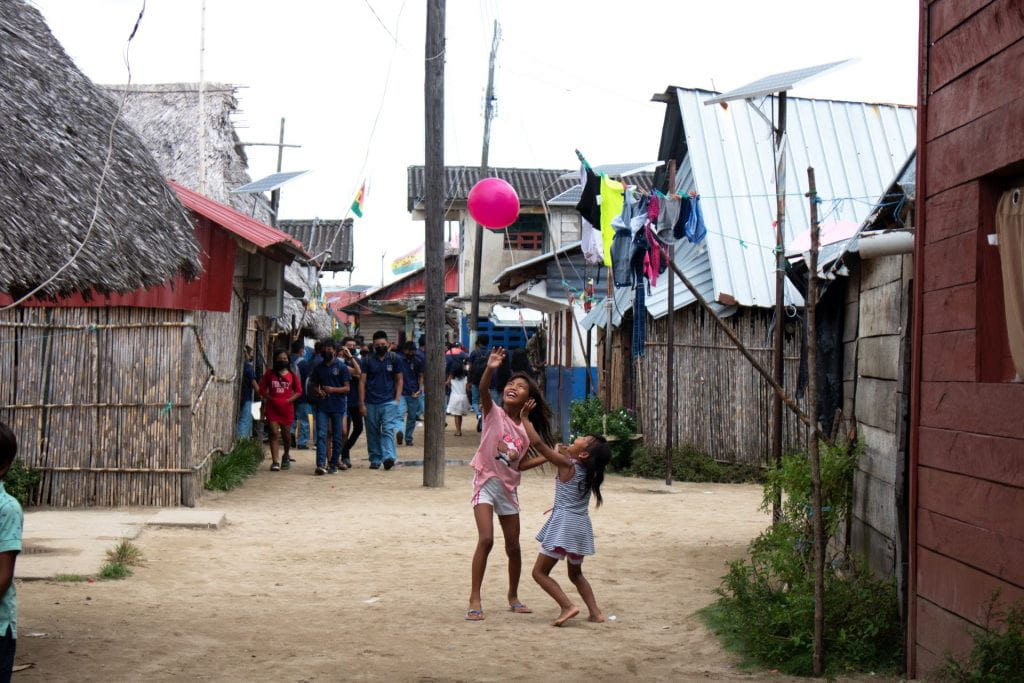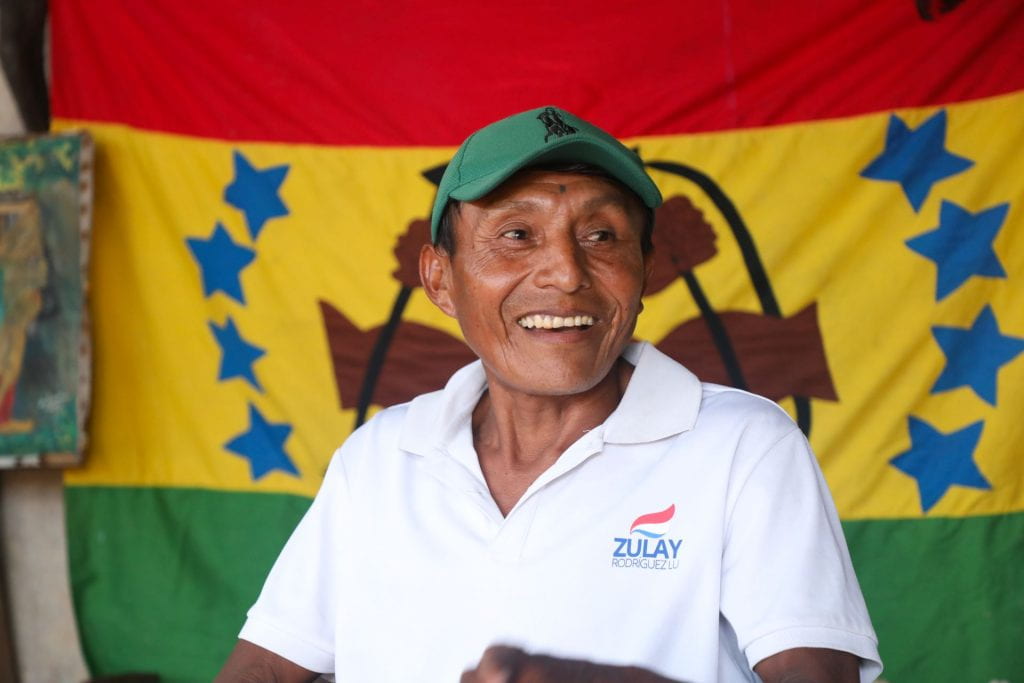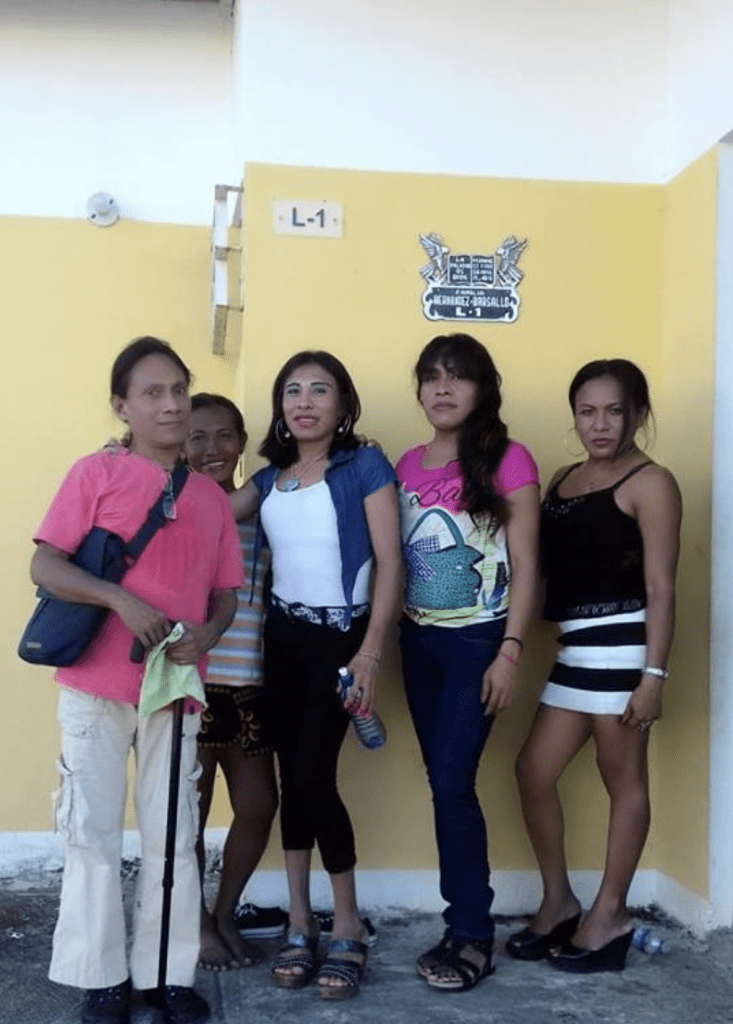The Wigudun: Acceptance of transgender individuals in the Guna Yala comarca
By Greta Magendantz

CASCO VIEJO, Panama — In the historic district of Panama City, Nandin Solis is making small talk about the weather as she scrolls on her phone. “Mira,” she says, presenting the screen to show off a picture of herself dressed in a pink button-up and American First Lady Jill Biden.
In fact, Solis had just come from a meeting with Biden at which she talked about the issue of HIV in Panama. “She was very kind,” said Solis. “I hope you might meet her one day.”
This was nothing new for Solis, 62, who has spent most of her adult life advocating for marginalized groups. She is a daughter, friend, activist, ally, a Guna and a transgender woman. But at the intersection of her gender identity and her ethnicity lies one more word that she uses to identify herself: “Wigudun,” derived from Guna mythology – a word that reflects the culture’s ideas about gender.

In Guna mythology, a number of siblings emerged from the sky to populate the Earth, Ned Gil Smith, a Guna HIV advocate in Panama city, explained. “Everything in our culture revolves around these original people,” Smith said through a translator. “They are like our Adam and Eve.”
The first was a brother who hunted and fished, the second a sister who cared for the children, cooked and sewed. The third, however, was more remarkable.
“One of those siblings was more ‘girly’ than the rest,” said Smith, explaining the person’s long hair and tendency to cook, care for the house and bring food to the other siblings. He refers to the third sibling as Wigudun.
The duality of Wigudun’s personality could be observed in her everyday activities. “So what the Wigudun would do is, during the day she would help the older brother to hunt, to fish and during the night would help the second, the sister, to sew the [traditional patterned quilts, or] molas and organize the house,” said Solis through a translator.
“That’s why they are considered one soul with two spirits.”
The Wigudun is celebrated when Guna people give thanks to their ancestral spirits. In these ceremonies, a delegate from each community acts as the connection between the spiritual and earthly worlds. Fabio Lopez, this delegate and a self-described “medicine man” of 32 years, happily explained the medicinal properties of plants, the practices of chanting and the sacred nature of passing down these customs to the next generation.

However, he refused to comment on the Wigudun, referring any questions about the spirit to the community’s silas, or chiefs. “That is for the silas to talk about,” Lopez said through a translator, with a content smile spread across his face. He raised both hands toward the sky. “The Wigudun is above my power,” he said.
Gender identity and the Wigudun
Transgender members of the Guna community, like Solis, have come to recognize and affirm themselves through this mythological figure.
Solis is ethnically Guna, meaning her ancestral ties are to the people of the Guna Yala comarca, an indigenous territory in Panama. But her story starts in Panama City. Here, she was raised by her mother, a public school teacher with a Western mindset. She remembers a childhood spent primarily with female friends and neighbors, playing with dolls and dressing up.
When Solis graduated from high school, she came out to her mother as a gay man. However, she didn’t ever feel that this title completely encapsulated her identity.
“I realized that I was different from gays. The way I felt, the way I looked at life, was different,” Solis said. “When I started to travel the world, that’s when I realized (…) I was actually a woman.”
Only when Solis visited the Guna Yala comarca was she able to find a word that completely captured who she was. Smith remembers the first time his friend discovered the concept of a Wigudun. “When [Nandin and I] were visiting the islands, and the chiefs were meeting us, they would say to Nandin: ‘Wigudun!’”
Solis did not know about Wigudun due to her urban upbringing. Guna leaders helped her to learn about the cultural importance of Wigudun, and how she may apply it to her own identity. “One chief pulled me aside and told me about what the Wigudun is,” said Solis. “I was shocked to learn about this part of my own culture. I felt so understood.”
Solis made use of the Guna Congress, when leaders and citizens unite to speak about local issues, to explore her identity; the older members of these communities were particularly supportive. “I would raise my hand and say, ‘I want to talk about my person: What am I? Is there something wrong with me? Why am I different?’ And the elders would say ‘No, there is nothing wrong with you. You are just a woman.’”
Acceptance
The traditional acceptance of transgender individuals like Solis by the Gunas is due to their beliefs about the creation of the world. “Because this belongs to our own belief of how the world was created, it is not something that is ‘strange’,” Smith said. “It is something that belongs to us, anyways, so we accept it because it’s how the Earth was created.”
This culture of inclusion differs entirely from the rest of Panama, according to Smith. He spoke to the way that LGBTQ+ youth in most of the country are not comfortable coming out, even to their own families. “In the Latino communities, it’s completely different [from Guna communities],” said Smith. “The families might even reject the person from the family.”
The Guna style of parenting, on the other hand, is historically centered around honoring those who identify with a gender different from the one they were born into. “It’s very different in the Guna communities,” said Smith. “It’s accepted, so the mom (…) teaches you what to do and how to behave depending on what you show to be oriented to.”
Solis also described the culture of mothers embracing their transgender children in Guna communities. She spoke to the traditional gender roles that mothers will teach to their transgender daughters, including sewing mola, a traditional garment worn by Guna women. “The mom takes the kid with her,” she said, reaching out her own arm in a gentle but firm grasp around an imaginary child, “and will raise the kid as whatever they are.”
The traditional attitude toward transgender individuals in Guna indigenous communities fosters a culture of openness and acceptance about the phenomenon of openly LGBTQ+ people in the Guna Yala comarca, Smith said:
“It’s funny, just today I was talking about that with a friend,” he said. “The friend was asking me, ‘Why is it that there are more [LGBTQ+ people] in the Guna communities?’” To this, Smith replied: “‘Well, it’s not that there are more, but that they are accepted, so they don’t have to hide.’”
The historically welcoming culture present in Guna communities has been life-changing for LGBTQ+ individuals in these areas. Smith spoke to the discrimination that he has seen Solis face outside of the Guna Yala comarca. “When we spend time together in the city, people often point at Nandin and laugh or yell,” said Smith. But she does not seem fazed. “Nandin just continues on walking confidently. It is not even close to the worst she has experienced.”
The mental toll that this type of harassment and lack of acceptance has on members of the LGBTQ+ community is perceived by medical experts nationwide. “In general, if LGBTQ people are not supported by the community, it increases the stigma and discrimination,” Dr. Jazmin G. Higuero of the STI, HIV and AIDS Section of the Panamanian Ministry of Health said.
In contrast, Gunas who grow up in the comarca have historically shown a different pattern of behavior due to acceptance within their respective communities. “When [LGBTQ+ people] are supported, they develop as people who express their identity freely and without fear of discrimination,” said Astevia Avila, a community health national nursing coordinator at the Panamanian Health Ministry. “This also favors participation in activities that positively impact themselves and their peers, such as social participation, fight for rights, among others.”
Activists from the Guna community have also been more directly involved in efforts to combat physical illnesses that affect LGBTQ+ individuals globally. Maydel Martínez, head doctor of an antiretroviral therapy clinic in the Guna Yala region sponsored by the Panamanian Ministry of Health, spoke to the actions Guna people took following the first confirmed case of HIV in Panama in 1984. “When the first cases were detected in the country, we saw great community work, with promotion and participation of LGBTI groups from the [Guna] region,” said Martínez.
She described the ways in which the Guna community has historically welcomed forms of prevention while other areas of the country refused these resources. “This has led to the fact that this same population has imparted awareness of the situation and its management,” said Martínez. “This is something that should be strengthened with young people and continue to leave activists and peers committed to prevention and advice.”
Westernization and LGBTQ+ acceptance
As Solis finished detailing her experience of discovery, tears formed in her eyes. “So it was then when I discovered my own identity, Wigudun,” she said, contently folding up her hands and leaning back in her seat, bottom lip still quivering. “I started to act as a woman.”
But another sentence remained on her pursed lips. She hesitated for a second, then leaned forward, as if sharing a secret. “That was 20 years ago. Now, the story is completely different.”
From here, a contemporary layer of the story unfolded as Solis detailed the changes in Guna ideology that have occurred over the past two decades. She says that as western ideals spread throughout Panama, so did transphobia. Transgender women, including Solis, have noticed a dropoff in acceptance in indigenous Guna areas.
“Now, when the [transgender] women go back to the community and show themselves, make noise, that doesn’t go well with the chiefs,” Solis said.
She explained that the leaders of Guna communities do not agree with the developments in makeup, clothing, hormone therapy and gender affirming-surgeries that transgender people might take part in, a bias that Solis attributes to western influences. “The chiefs already have the discrimination idea in their minds,” she said. “They acquired that from the western world.”
This change in ideals was discernible among Guna leaders. On a sunny June day in Cangandi, a small community in the Guna Yala comarca, the regional silas, or chiefs, swung back and forth on hammocks in the congressional house.
On topics ranging from agriculture to midwifery, the chiefs took turns sharing their perspectives, overlapping and consulting with one another in the process. However, when the idea of Wiguduns surfaced, a brief, tense silence fell over the group.

“Yeah, right over there,” said Paolino Contreras, one of the community silas, through a translator, pointing at a man sitting on one of the wooden benches in the corner of the hall. Laughter erupted from all three. “It’s just a joke,” a translator explained quickly. “Omigir,” Contreras said between chuckles, employing a politically incorrect Guna word that Solis says means “feminine man.”
The people holding the same positions in 2022 as those who helped Solis to discover her true identity many years ago are not so accepting. She worries that this mindset is spreading to members of the communities, as well.
Solis also appeared frustrated with the way that some have begun to employ traditional Guna mythology to exclude certain individuals. This especially includes transgender men, who are much less accepted in the Guna community.
An ongoing battle
In 2013, Solis and other transgender Guna women started to notice these changes in the Guna communities, which had once acted as safe havens for them. In response, they decided to start their own advocacy organization, Wigudun Galu.
The group works to raise awareness about gender diversity and equality. Although it has been operational for nine years, the organization only received official recognition in February. Using grants from the Global Fund and The Foundation for AIDS Research (amFAR), the leaders of Wigudun Galu have received training on organizing their group, attending conventions and more.
Solis and the other leaders of Wigudun Galu place a lot of value on local leadership. Their goal is to connect with chiefs, Guna and otherwise, to address newly transphobic attitudes and how they impact the community.
“Now we are working hard with the leaders of the communities to change that chip of discrimination,” said Solis. “That’s the reason why the organization was born, to fight for transgender indigenous rights.”